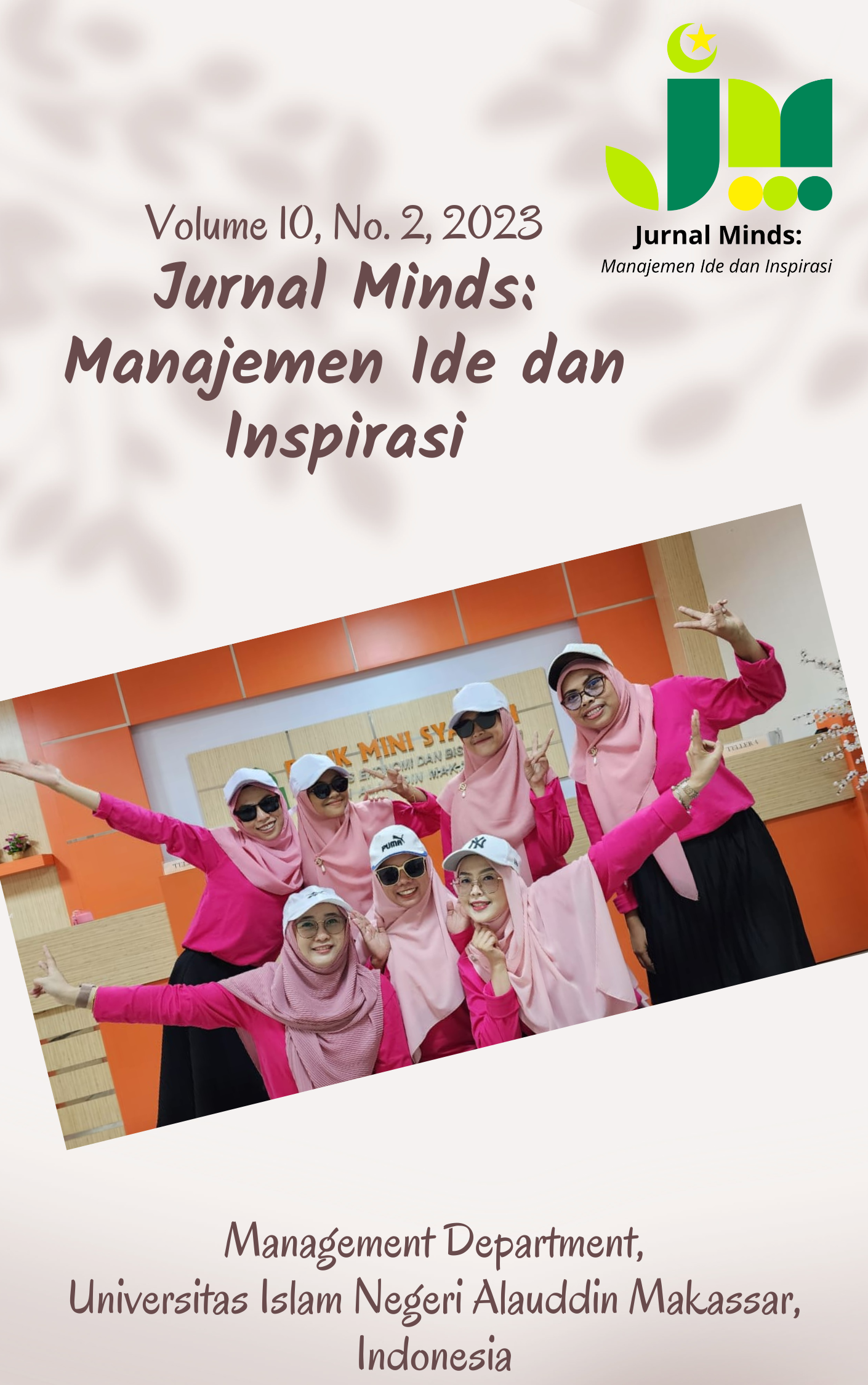Date Log
Copyright (c) 2023 Amir Mahmud (Author)

This work is licensed under a Creative Commons Attribution 4.0 International License.
Intervening for Good: Governmental Intervention for Enhancing Service Worker Capability in Hospitality Business
Corresponding Author(s) : Amir Mahmud
Jurnal Minds: Manajemen Ide dan Inspirasi,
Vol. 10 No. 2 (2023): December
Abstract
In the vibrant world of hospitality, the workforce serves as the pillar of regional tourism growth. The symbiotic relationship between hotel staff, the service providers, and guests, the consumers, is at the heart of this industry. Hotels, therefore, must continually enhance their staff quality, as they are the hotel’s living embodiment. Recognizing this, the Indonesian government has implemented certification programs through the Tourism Office to maintain service standards. This study delves into the impact of such interventions on service quality. It juxtaposes the self-evaluation of workers (n=325) post-intervention with customer perceptions (n=454), revealing a positive correlation between government intervention, employee self-assessment, and customer satisfaction.
Keywords
Download Citation
Endnote/Zotero/Mendeley (RIS)BibTeX
References
Bani-Melhem, S., Zeffane, R., & Albaity, M. (2018). Determinants of employees’ innovative behavior. International Journal of Contemporary Hospitality Management, 30(3). https://doi.org/10.1108/IJCHM-02-2017-0079
Bondarenko, V. A., Efremenko, I. N., & Larionov, V. A. (2019). Marketing strategy for hotel and tourist complex companies. International Journal of Economics and Business Administration, 7.
Davis, N. J., & Robinson, R. V. (2006). The egalitarian face of Islamic orthodoxy: Support for Islamic law and economic justice in seven Muslim- majority nations. American Sociological Review, 71(2). https://doi.org/10.1039/b507854g
Fida, B. A., Ahmed, U., Al-Balushi, Y., & Singh, D. (2020). Impact of Service Quality on Customer Loyalty and Customer Satisfaction in Islamic Banks in the Sultanate of Oman. SAGE Open, 10(2), 1–10. https://doi.org/10.1177/2158244020919517
Heskett, J. L., Jones, T. O., Loveman, G. W., Sasser, W. E., & Schlesinger, L. A. (2008). Putting the service-profit chain to work. Harvard Business Review, 86(7–8).
Kamakura, W. A., Mittal, V., De Rosa, F., & Mazzon, J. A. (2002). Assessing the service-profit chain. Marketing Science, 21(3). https://doi.org/10.1287/mksc.21.3.294.140
Khan, F., & Callanan, M. (2017). The “Halalification” of tourism. Journal of Islamic Marketing. https://doi.org/10.1108/JIMA-01-2016-0001
Lin, M., Ling, Q., Liu, Y., & Hu, R. (2021). The effects of service climate and internal service quality on frontline hotel employees’ service-oriented behaviors. International Journal of Hospitality Management, 97. https://doi.org/10.1016/j.ijhm.2021.102995
Liu, C., & Yang, J. (2021). How hotels adjust technology-based strategy to respond to COVID-19 and gain competitive productivity (CP): strategic management process and dynamic capabilities. International Journal of Contemporary Hospitality Management. https://doi.org/10.1108/IJCHM-10-2020-1143
Omoregie, O. K., Addae, J. A., Coffie, S., Ampong, G. O. A., & Ofori, K. S. (2019). Factors Influencing Consumer Loyalty: Evidence from The Ghanaian Retail Banking Industry. International Journal of Bank Marketing, 37(3), 798–820. https://doi.org/10.1108/IJBM-04-2018-0099
Ordanini, A., & Parasuraman, A. (2011). Service innovation viewed through a service-dominant logic lens: A conceptual framework and empirical analysis. Journal of Service Research, 14(1). https://doi.org/10.1177/1094670510385332
Parasuraman, A., Zeithaml, V. A., & Berry, L. L. (1985). A Conceptual Model of Service Quality and Its Implications for Future Research. Journal of Marketing, 49(4), 41. https://doi.org/10.2307/1251430
Punjaisri, K., Evanschitzky, H., & Wilson, A. (2009). Internal branding: An enabler of employees’ brand-supporting behaviours. Journal of Service Management, 20(2). https://doi.org/10.1108/09564230910952780
Reichheld, F. F., & Sasser, W. E. (1990). Zero defections: quality comes to services. Harvard Business Review, 68(5).
Rita, P., Oliveira, T., & Farisa, A. (2019). The Impact of e-Service Quality and Customer Satisfaction on Customer Behavior in Online Shopping. Heliyon, 5, 1–14. https://doi.org/10.1016/j.heliyon.2019.e02690
Rodríguez-Victoria, O. E., Puig, F., & González-Loureiro, M. (2017). Clustering, innovation and hotel competitiveness: evidence from the Colombia destination. International Journal of Contemporary Hospitality Management, 29(11), 2785–2806. https://doi.org/10.1108/IJCHM-03-2016-0172
Rucci, A. J., Kirn, S. P., & Quinn, R. T. (1998). The employee-customer-profit chain at SEARS. Harvard Business Review, 76(1).
Schaufeli, W. B., Bakker, A. B., & Salanova, M. (2006). The measurement of work engagement with a short questionnaire: A cross-national study. Educational and Psychological Measurement, 66(4). https://doi.org/10.1177/0013164405282471
Schneider, B. (1980). The service organization: Climate is crucial. Organizational Dynamics, 9(2). https://doi.org/10.1016/0090-2616(80)90040-6
Sulmi, A. A. K., Awaluddin, M., Gani, I., & Kara, M. (2021). Pengaruh Persepsi Kegunaan, Kemudahan, dan Keamanan Terhadap Minat Menggunakan Layanan Mobile Banking (Studi Empiris Pada Mahasiswa Fakultas Ekonomi Dan Bisnis Islam Uin Alauddin Makassar). Islamic Banking, Economic and Financial Journal, 1(2), 59–73.
Tegambwage, A. G., & Kasoga, P. S. (2022). Antecedents of Customer Loyalty in Islamic Banking: Evidence From Tanzania. Journal of Islamic Accounting and Business Research, 13(4), 701–713. https://doi.org/10.1108/JIABR-10-2021-0288
Vargas-Sánchez, A., & Moral-Moral, M. (2019). Halal tourism: literature review and experts’ view. Journal of Islamic Marketing. https://doi.org/10.1108/JIMA-04-2017-0039
Wai Lai, I. K. (2019). Hotel image and reputation on building customer loyalty: An empirical study in Macau. Journal of Hospitality and Tourism Management, 38. https://doi.org/10.1016/j.jhtm.2019.01.003
Yang, J. te. (2012). Identifying the attributes of blue ocean strategies in hospitality. International Journal of Contemporary Hospitality Management, 24(5). https://doi.org/10.1108/09596111211237255
Yao, T., Qiu, Q., & Wei, Y. (2019). Retaining hotel employees as internal customers: Effect of organizational commitment on attitudinal and behavioral loyalty of employees. International Journal of Hospitality Management, 76. https://doi.org/10.1016/j.ijhm.2018.03.018
Yee, R. W. Y., Yeung, A. C. L., & Edwin Cheng, T. C. (2010). An empirical study of employee loyalty, service quality and firm performance in the service industry. International Journal of Production Economics, 124(1). https://doi.org/10.1016/j.ijpe.2009.10.015
